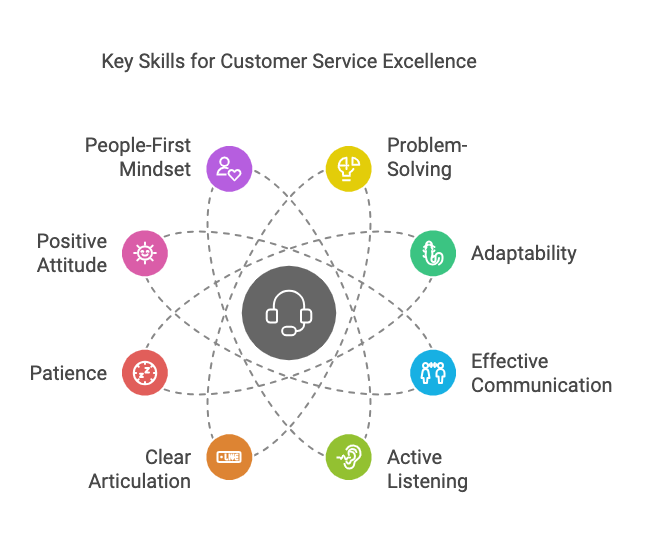Un service client exceptionnel peut transformer les entreprises. Il renforce la confiance, la fidélité et les relations durables. Des études montrent que 731% des consommateurs aiment les marques qui personnalisent leurs interactions.
Les représentants du service client exceptionnels possèdent des traits de personnalité essentiels. L'intelligence émotionnelle, l'adaptabilité et une communication efficace sont essentielles.
Chacun de ces traits a un impact significatif sur la satisfaction du client et la réputation de l’entreprise.
Cet article explore les traits essentiels pour maîtriser le service client. Nous mettrons en évidence des stratégies pour développer ces traits et mesurer le succès.
Préparez-vous à améliorer votre service client !
Table des matières
L'importance du service client
Les compétences en matière de service client sont essentielles à la réussite d'une entreprise. Elles influencent la satisfaction et la fidélité des clients, ainsi que la réputation de la marque.
Un excellent service client peut stimuler les ventes car il adapte les services aux besoins du client, ce qui lui permet de se sentir valorisé. Les clients satisfaits sont plus susceptibles de revenir et de dépenser plus.
Créer des expériences positives favorise la fidélité des clients. Un service exceptionnel transforme les clients en promoteurs de la marque.
Cela conduit à davantage de recommandations de bouche à oreille et à une meilleure réputation de la marque. Selon une étude, 89% des consommateurs sont plus susceptibles de faire un autre achat après une expérience positive.
Une équipe de service client motivée est essentielle. Des employés heureux fournissent un service de haute qualité, ce qui a un impact positif sur les interactions avec les clients.
Investir dans la satisfaction des employés se traduit par un meilleur service client. Des compétences clés comme la communication et la compréhension des attentes des clients sont essentielles.
| Trait clé | Impact sur le service |
|---|---|
| Attitude positive | Crée des interactions amicales |
| Communication efficace | Résout les demandes des clients |
| Connaissance du produit | Informe efficacement les clients |
Traits de personnalité essentiels pour les représentants du service client
Une équipe de service client performante requiert les qualités requises, notamment l’intelligence émotionnelle, la patience et un état d’esprit positif.

Les représentants doivent posséder ces qualités pour gérer efficacement diverses interactions avec les clients. Examinons plus en détail chacune de ces qualités essentielles.
Intelligence émotionnelle
Une intelligence émotionnelle élevée est essentielle pour les postes de service client. Les représentants savent gérer leurs émotions et faire preuve d'empathie envers les clients. Cette compétence permet de gérer les situations délicates avec calme.
L'empathie renforce les relations avec les clients et renforce la confiance. L'intelligence émotionnelle est le principal indicateur de performance professionnelle dans les rôles de service.
Compétences en résolution de problèmes
Les compétences en résolution de problèmes sont essentielles pour chaque représentant. Elles permettent d'identifier rapidement les problèmes des clients et de leur fournir des solutions efficaces. Cela est particulièrement vrai pour les représentants à distance qui ne bénéficient pas du soutien de l'équipe.
Les clients apprécient les représentants qui peuvent répondre à leurs préoccupations de manière préventive. La résolution ingénieuse des problèmes conduit à une plus grande satisfaction client.
Adaptabilité
L'adaptabilité est essentielle dans les environnements de service dynamiques. Les représentants doivent s'adapter aux attentes changeantes des clients. Des interactions diverses nécessitent des styles de communication flexibles.
Les équipes qui favorisent la collaboration améliorent leur adaptabilité. Des ajustements rapides contribuent à maintenir des expériences client positives.
Effective Communication
Une communication efficace ne se résume pas à une simple bonne expression orale. Elle implique également le langage corporel et le ton de la voix. L'écoute active et les signaux non verbaux sont très importants.
Une communication claire évite les malentendus. Maintenir l'empathie apaise les interactions difficiles avec les clients.
Active Listening
L'écoute active est essentielle pour comprendre les besoins exacts des clients. Elle consiste à paraphraser et à clarifier les préoccupations des clients. Cette compétence aide les représentants à offrir des expériences personnalisées.
Les activités de groupe peuvent améliorer les capacités d'écoute au sein des équipes. Une compréhension rapide des problèmes conduit à de meilleures solutions.
Articulation claire
La clarté dans la communication augmente la satisfaction du client. Un langage positif influence considérablement les perceptions.
La continuité dans la communication est essentielle pour éviter les répétitions. L'accès à des informations cohérentes garantit une articulation claire. L'empathie permet de créer des expériences d'interaction client mémorables.
Patience
La patience est la pierre angulaire d'un service efficace. Écouter sans se précipiter améliore l'expérience client. Cela permet également de désamorcer les émotions négatives.
L'impatience peut compromettre la qualité du support. La patience est bénéfique pour les interactions avec les clients et les membres de l'équipe.
Attitude positive
Une attitude positive égaye les rencontres avec les clients. Elle apaise les conflits et permet de trouver des solutions plus faciles. L'optimisme transforme les opinions insatisfaites en commentaires constructifs.
Un travail d'équipe positif produit des solutions optimales. Les clients repartent avec un état d'esprit confiant et satisfait.
Mentalité axée sur l’humain
L'approche centrée sur l'humain se concentre sur les relations humaines. Elle reconnaît les défis uniques des clients. L'empathie permet de faire face aux difficultés pratiques et émotionnelles.
Des réponses réfléchies permettent de désamorcer les situations tendues. Une approche de service centrée sur les personnes favorise une fidélité durable des clients.
| Trait | Bénéfice en matière de service client |
|---|---|
| Intelligence émotionnelle | Gère les situations sensibles |
| Résolution de problèmes | Fournit des solutions efficaces |
| Adaptabilité | S'adapte aux changements des clients |
| Effective Communication | Élimine la confusion |
| Active Listening | Comprend parfaitement les besoins des clients |
Le rôle de l’empathie dans les interactions avec les clients
L'empathie est la pierre angulaire d'un service client exceptionnel. Elle permet de créer des liens, essentiels pour une expérience client positive.
Environ 731 TP3T de clients attendent de l'empathie. Ils veulent que les entreprises comprennent leurs besoins spécifiques. Cela souligne l'importance de l'empathie dans les interactions avec les clients.
Faire preuve d'empathie signifie affirmer les sentiments du client. Cela implique de comprendre les frustrations, même celles qui échappent au contrôle du représentant.
L'empathie permet de partager les émotions des clients. Elle permet aux représentants de répondre efficacement aux préoccupations. C'est essentiel pour créer une expérience client positive.
Pour les représentants du service client, l’empathie est une compétence indispensable. Elle permet de comprendre intuitivement les frustrations des clients. Les qualités empathiques doivent être évaluées lors du recrutement.
Ils veillent à ce que les réponses soient appropriées et réfléchies. Un service axé sur l'empathie conduit à la satisfaction et à la fidélité des clients.
Voici comment l’empathie se manifeste dans les interactions avec les clients :
| Compétences en matière d'empathie | Avantages |
|---|---|
| Affirmation | Crée la confiance avec les clients |
| Compréhension | Réduit la frustration des clients |
| Partage émotionnel | Répond efficacement aux préoccupations |
| Réponses intuitives | Améliore la satisfaction client |
Créer des expériences client personnalisées
Personnaliser le service client n'est pas seulement agréable, c'est essentiel. Chaque interaction avec un client doit être unique et répondre aux besoins personnels.
La compréhension de ces besoins commence par une écoute active ; elle ouvre la voie à des actions réellement satisfaisantes. Les clients remarquent que leur expérience est adaptée à leurs besoins et qu'ils se sentent valorisés.
L’empathie dans les interactions avec les clients renforce la confiance. Lorsque les clients se sentent compris, la relation se renforce naturellement. La mise en œuvre d’une approche axée sur les personnes, en suivant la règle de platine, renforce ce lien.
L'équipe du service client doit être prête à s'adapter en fonction des préférences individuelles. Cela permet non seulement d'enrichir l'expérience client, mais aussi de renforcer considérablement la fidélité.
Des solutions rapides sont essentielles pour satisfaire les clients. Les clients détestent attendre des réponses et s'attendent à des solutions rapides.
Une approche proactive garantit que les problèmes sont résolus rapidement, ce qui conduit à des expériences client positives. Par conséquent, la patience est une vertu, mais la rapidité fait fidéliser les clients.
Voici un tableau rapide résumant quelques points clés :
| Caractéristiques principales | Impact sur les clients |
|---|---|
| Active Listening | Définit le chemin d'action |
| Empathie | Favoriser la confiance et la connexion |
| Une attitude qui place l’humain au premier plan | Améliore l'expérience globale |
| Résolutions rapides | Crée des expériences positives |
Fidélisation à long terme des clients
Fidéliser ses clients à long terme est essentiel pour la réussite d'une entreprise. expériences de service client que les clients adorent.
Des employés heureux sont synonymes de service de qualité, ce qui accroît la satisfaction des clients. Ce cycle améliore la réputation et les performances financières d'une entreprise.
Le fait de faire preuve de professionnalisme à chaque interaction renforce la confiance. La confiance est essentielle pour établir des relations clients à long terme. L'empathie joue également un rôle essentiel ici. Lorsque vous comprenez et prenez soin des clients, la fidélité et la satisfaction se renforcent.
La persévérance est une autre qualité essentielle. Résoudre les problèmes des clients montre que leurs préoccupations comptent. Cela améliore l'expérience globale et favorise la fidélité.
Une équipe de support client dédiée est essentielle pour y parvenir.
Considérez ces statistiques issues d’études récentes :
| Trait | Impact sur la fidélité (%) |
|---|---|
| Active Listening | 61 |
| Empathie | 74 |
| Professionnalisme | 82 |
| Des employés heureux | 59 |
Fidéliser ses clients n'est pas une simple tâche. C'est une stratégie axée sur la passion pour un succès durable !
Stratégies pour développer des traits clés
Développer des qualités clés est essentiel pour garantir l'excellence du service client. L'écoute des commentaires des clients permet d'améliorer les stratégies. Fixez-vous des objectifs mesurables pour suivre efficacement les progrès. Embauchez des personnes possédant les qualités requises pour un impact maximal.
Programmes de formation
La formation est essentielle pour maintenir la qualité du service. Des programmes complets couvrent les fonctionnalités des produits, les politiques et les compétences essentielles.
L'apprentissage continu renforce l'adaptabilité et la résilience. Les modules de formation en ligne simplifient l'accès aux informations essentielles.
| Principaux sujets de formation | Importance (%) |
|---|---|
| Connaissance du produit | 85 |
| Compétences générales | 90 |
| Résolution de conflits | 88 |
| Active Listening | 92 |
La mise en place d’un système de parrainage améliore l’apprentissage pratique. Il comble les lacunes en matière de connaissances et favorise la croissance professionnelle.
Scénarios de jeu de rôle
Le jeu de rôle prépare les agents aux défis du monde réel. La pratique permet de développer l'empathie dans un environnement sûr. Les commentaires des pairs affinent les compétences d'écoute active.
Il met en évidence les signaux de communication verbaux et non verbaux. L'exploration de différentes approches améliore l'adaptabilité.
Rétroaction continue
Le feedback est essentiel pour affiner les stratégies de service. Des enquêtes régulières permettent de mesurer l'efficacité des agents et la satisfaction des clients.
Analysez les retours informels issus des interactions quotidiennes. Encouragez une culture de communication ouverte pour favoriser la croissance. Les connaissances acquises génèrent des améliorations significatives.
Auto-réflexion et auto-amélioration
Prendre soin de soi garantit une performance de qualité dans les rôles de service client. Les représentants doivent faire preuve de patience et offrir un soutien personnalisé.
Le contenu pédagogique contribue à créer des liens plus étroits avec la marque. Le feedback est essentiel à l'autoréflexion et à l'amélioration continue. Il pose les bases d'une satisfaction client à long terme.
Mesurer le succès du service client
Les professionnels du service client résilients améliorent chaque interaction. Ils apprennent des expériences passées et améliorent leurs services.
Cette adaptabilité garantit une attitude de service positive. Elle transforme chaque tâche en une expérience client satisfaisante. La résilience est essentielle pour développer des clients satisfaits.
Les personnes qui exercent un contrôle interne prennent les choses en main. Elles sont proactives et garantissent de meilleurs résultats pour les clients. La responsabilité engendre le succès dans la satisfaction des attentes des clients.
Cela conduit à des expériences client toujours positives. Ces qualités des agents du service client comptent vraiment.
L'optimisme est essentiel pour les représentants du service client. Une attitude positive renforce la confiance des clients. Elle transforme les rencontres de service en expériences agréables.
Les représentants optimistes inspirent la fidélité et la satisfaction des clients. Une attitude joyeuse peut effectivement rendre les clients heureux.
Il est essentiel de procéder à des examens périodiques des indicateurs de service. Ils permettent d'identifier les domaines à améliorer. Les décisions fondées sur les données améliorent la satisfaction client.
Une évaluation objective permet de maintenir le service client à jour. Les indicateurs de performance sont essentiels pour des équipes de service client efficaces.
Le multitâche est une qualité essentielle pour réussir. Il permet aux professionnels de gérer davantage de tâches. L'équilibrage efficace des tâches répond aux divers besoins des clients.
Ces compétences améliorent considérablement l'expérience client. Le multitâche incite les équipes de service client à aller plus loin.
Indicateurs clés de performance (KPI)
Examinez régulièrement les indicateurs de performance du service. Cela permet d'évaluer ce qui fonctionne et ce qui ne fonctionne pas. En les identifiant, vous améliorez la satisfaction client.
L'analyse périodique est essentielle pour une amélioration continue. Les données guident une équipe de support client vers l'efficacité.
La cartographie du parcours client est précieuse. Elle révèle les lacunes et les points faibles potentiels. Cette connaissance permet d'affiner les processus clients.
Les plans d'action peuvent inclure de nouvelles politiques et formations. La cohérence est essentielle pour maintenir l'excellence du service.
Intégrez les points de vue des employés aux stratégies d’amélioration. Ceux qui interagissent avec les clients offrent des perspectives uniques. Il est essentiel d’évaluer le service client à travers leur point de vue.
Il identifie les défis et les opportunités du monde réel. La contribution des employés est un facteur déterminant pour l'amélioration du service.
Commentaires et enquêtes auprès des clients
Les enquêtes de satisfaction client permettent d'obtenir un retour d'information honnête. Elles mettent en évidence les points forts et les points faibles. Elles permettent de mieux comprendre les attentes des clients.
Ces retours d'expérience permettent d'améliorer les stratégies de service. Un service client efficace repose sur des informations sincères.
Examinez régulièrement les commentaires pour adapter les stratégies. Les ajustements permettent de mieux aligner les services sur les besoins des clients. Un perfectionnement continu permet de satisfaire et de fidéliser les clients.
Le feedback est un outil permettant de transformer les expériences négatives. S'aligner sur les attentes garantit une expérience client positive.
Les commentaires peuvent prendre diverses formes. Les critiques et suggestions positives sont précieuses. Les remerciements sincères et les recommandations sont appréciés.
Le marketing par e-mail recueille et analyse ces commentaires. Les informations obtenues améliorent l'approche globale du service client.
Satisfaction des employés
La satisfaction des employés est cruciale. Les employés satisfaits offrent un excellent service client. Leur positivité se traduit par des interactions plus heureuses avec les clients.
Ce cycle est bénéfique pour la réputation et la croissance. La satisfaction des employés doit être aussi importante que la satisfaction des clients.
Des employés heureux améliorent la réputation de l'entreprise. La motivation conduit à des niveaux de service supérieurs. Les entreprises qui se concentrent sur le bonheur des employés connaissent une croissance.
Cela crée un environnement de service stable et efficace. Un employé heureux équivaut à un client heureux.
Google donne l'exemple en matière de concentration sur les employés. Les avantages sociaux et la culture favorisent l'innovation. Cette approche démontre le pouvoir de la satisfaction des employés.
Les entreprises devraient suivre ces modèles pour réussir. Valoriser les employés permet d'éviter la dégradation du service.
Voici un tableau rapide montrant l’effet du cycle positif :
| Composant | Impact |
|---|---|
| Satisfaction des employés | Des employés motivés |
| Une main d'oeuvre motivée | Excellent service client |
| Excellent service client | Des clients plus satisfaits |
| Des clients plus satisfaits | Réputation et croissance positives de l'entreprise |
Satisfaction des employés
Voici un tableau rapide montrant l’effet du cycle positif :
| Satisfaction des employés | Expérience client | Résultats commerciaux |
|---|---|---|
| Engagement élevé | Un service enthousiaste | Augmentation de la fidélisation de la clientèle |
| Culture de travail positive | Interactions personnalisées | Fidélité à la marque renforcée |
| Faible rotation du personnel | Une qualité de service constante | Croissance des revenus plus élevée |
| Reconnaissance et récompense | Empathie dans la gestion des problèmes | Avantage concurrentiel amélioré |
Conclusion
Dans un paysage où les attentes des clients évoluent continuellement, maîtriser les caractéristiques d’un bon service client est primordial pour la réussite de l’entreprise.
L’intelligence émotionnelle permet aux représentants d’établir un lien plus profond avec les clients, tandis que l’adaptabilité garantit qu’ils peuvent gérer efficacement une variété de situations.
De plus, d’excellentes compétences en communication favorisent la clarté et la compréhension, créant une expérience transparente pour le client.
En cultivant ces traits essentiels au sein de votre équipe de service client, vous améliorez non seulement l’expérience client globale, mais vous stimulez également la fidélité et la satisfaction à la marque.
N’oubliez pas que l’objectif du service client n’est pas seulement de résoudre les problèmes, mais de créer une interaction positive et mémorable qui donne envie aux clients de revenir.
Investir dans ces traits de personnalité clés conduira à terme à une meilleure réputation de marque et à une entreprise prospère. Donnez la priorité à ces qualités et regardez votre service client redéfinir le succès.





